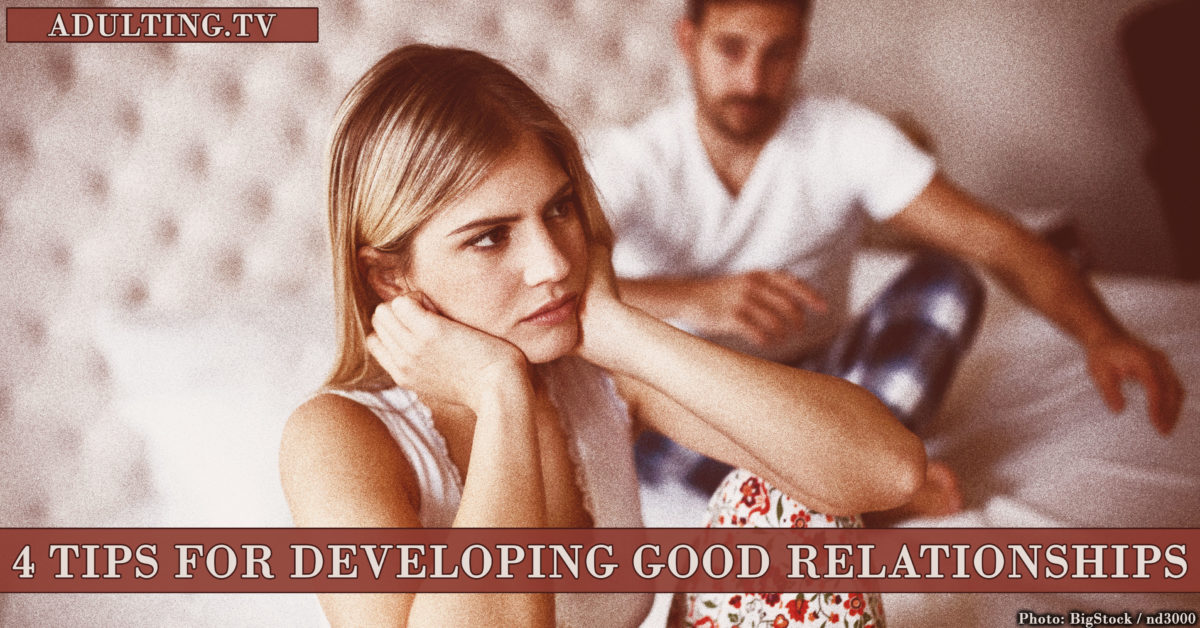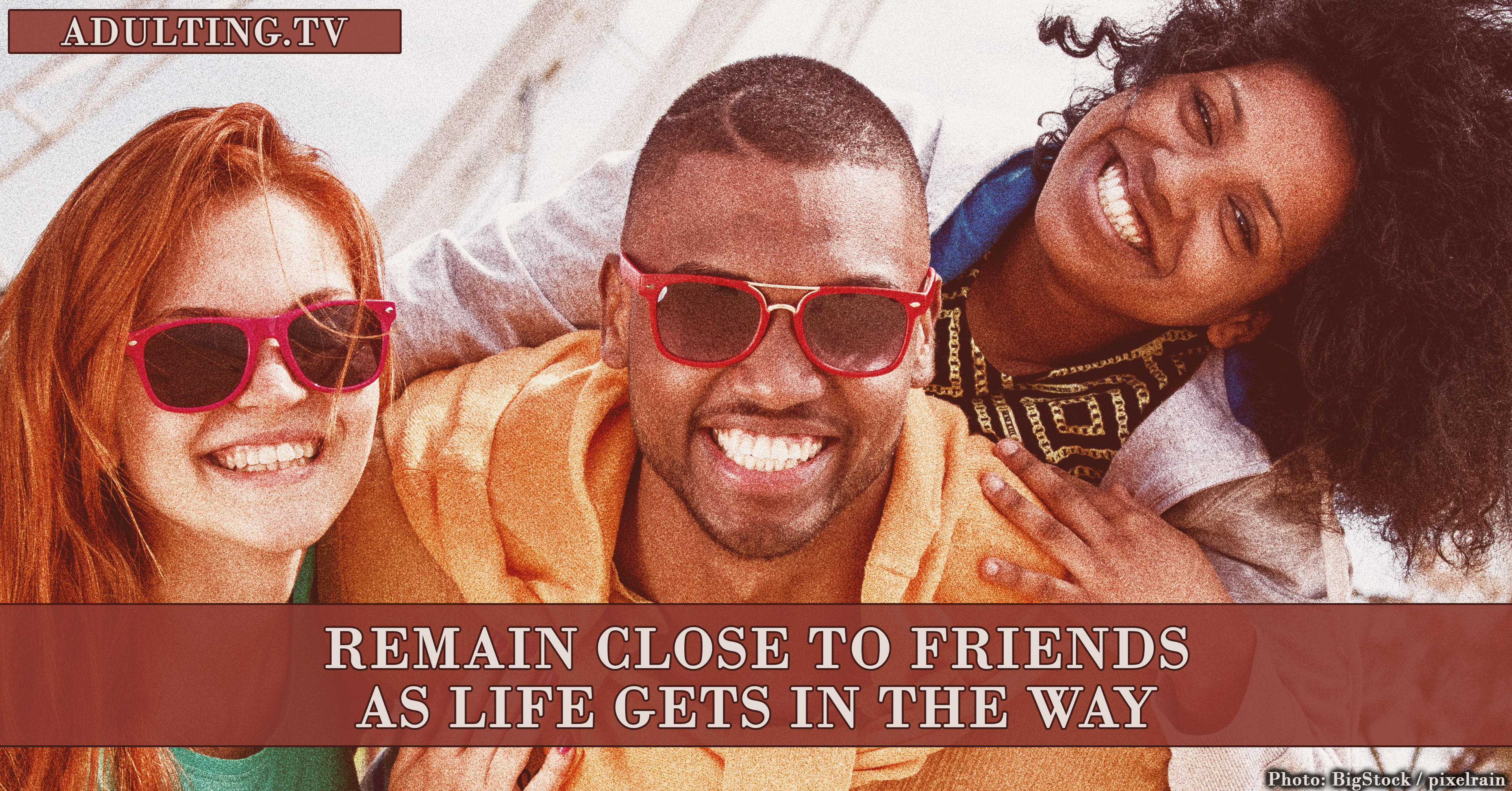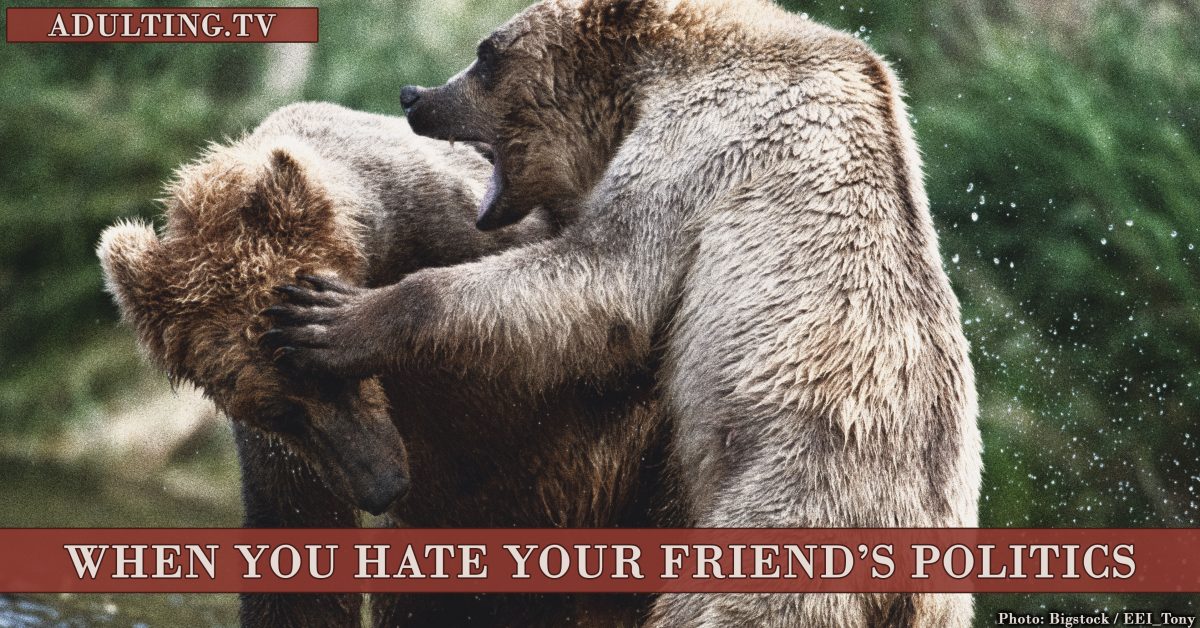As a kid, the holidays are a time of fun. After all, you get presents, candy, and time off school. Holiday hijinks are a part of growing up.
Adults, though, need to learn how to change their view of the holidays. The things that were funny when you’re a kid are no longer in force. Plus no one thinks it’s fun to buy you presents anymore.
You can still enjoy the holiday season as an adult, but you do need to adjust your expectations.
Use our Do Nows to help you evaluate what you want out of the holidays, as well as learn strategies for putting together a budget-friendly gift exchange.
HARLAN – – Intro
MIRANDA – -Welcome to this week’s edition of Adulting. We’re going to talk about holiday hijinks. When is it time to stop acting like a kid for the holidays?
HARLAN – – Intro
HARLAN – – Welcome to adulating. I am Harlan Landes, and I’m here with Miranda Marquit. Hi, Miranda.
MIRANDA – Hi Harlan
HARLAN – – And today we’re talking about holiday hijinks.
Accept that you’re not a kid anymore. We all want to be a kid at heart, sure. But certain things happen around the holiday that tells us that maybe that it’s time to move on and it’s time now to be an adult. The biggest thing is, of course, gift giving.
So let’s talk about that. Miranda, do you have a story to share that moment that you first realized you’re an adult?
MIRANDA – -Or at least not a child anymore. Growing up of course as someone who celebrates Christmas, we always had that list that we could make, and even when we were beyond Santa Claus, in my family, we could still make a list. My parents said this is the budget, and then you could go ahead and move forward, and make this list. So when I came back, from college, my first semester, I said to my parents, here is my list, this is what I want for Christmas. This is my list, and it’s like one thing, and it’s expensive. I was surprised that my parents said, ‘You’re not a kid anymore, you don’t get to make a Christmas list, we’ll give you whatever we’re giving you!’
It ended up being useful things for my college experience, but it wasn’t the thing that I wanted on my list. And that was the time I realized, ‘Oh I’m not a kid anymore, and I can’t just demand things anymore,’ as children do. And that this holiday, and a lot of the holiday season: Christmas, Channukah, those kinds of things, those are for the children. Parents do these things to make things fun for the children. And you reach this point where your parents and your grandparents and all the people around you are maybe thinking, ‘You’re not cute and fun anymore, we don’t care about making this nice for you,’ and you have to accept that and do it with good grace, I guess.
HARLAN – -I think some of my friends still think that they’re young and cute and that the gifts are for them. So it’s made the holidays interesting, to say the least. I think the holidays are a chance for us to enjoy and celebrate the kids inside of us that are still there. What part of being an adult is recognizing that you don’t stop being who you are inside as you grow up? I think the question is, do you express that in a way so that you expect to get gifts from your friends just like you are a child? I think that’s the biggest question.
I have a friend who is just giddy about getting gifts, and he has a daughter who supports that and loves the fact that he loves getting gifts as much as she does. Which is entertaining, sure, but does putting the pressure on everyone else to play into this idea that we have to keep having to get gifts for each other? So, the way I see this, and what other people observe in this particular circle observe, is this doesn’t make any sense; this is not what adults do. Why is this happening? And you just have to say, well, we’re humoring someone who just gets a lot of joy out of this, so we just participate in it for him. I don’t participate that much now because I don’t see my friends that much anymore. So it feels odd to me, and there are other things we can do other than getting video games for each other. We can take each other to dinner, we can enjoy our time together, we can go to the movies, we can do things like that.
I know I don’t have room for anything else, so I don’t want any gifts from people. I don’t expect people to get gifts for me, I mean, at this point I don’t have lists. My parents will still ask, because they want to continue the relationship that we’ve had, as a child. And I grew up, and they still want to do this for me, and I’ll humor them and say, ‘ If you want to do something, here’s this,’ but I don’t expect anything at this point, and I don’t want anything.
MIRANDA – – I think that’s a good point, and I think sometimes we were stuck in this idea too, where we use this season as an excuse just to act idiotic and then aim to recapture our youth. And sometimes this is going out and using this as an excuse to get drunk and act stupid; sometimes it manifests in just buying a bunch of stuff that maybe we couldn’t afford as children. I know that my ex-husband did a lot of buying – expensive, big toys. At Christmas time, when we were getting stuff for my son, a lot of the things he would get were things that he wished he could have had as a child, so it’s this weird recapturing lost childhood, rather than focusing on spending some time with friends and family. I guess it comes down to figuring out, what does the holiday season mean to you? No matter which holidays you’re celebrating, what does it mean to YOU, and what personally do you want to try and get out of it?
HARLAN – -As adults, we can make a choice, if we want to spend our money on things, we can do that — we are adults. We can do that as long as we involve all of the affected people in the discussion. If you have someone in your relationship that’s going off and spending money on things that the family doesn’t need and the money isn’t there for that, then you run into some problems. But regarding being able to buy yourself presents, if that’s something that you want to do, it’s certainly allowable, it’s just a question of, as an adult, you just have to remember that in the back of your mind that you still have to focus on the important things. What is important around the holidays? Is there something special about the month of December that makes it the right time for everyone to participate in this holiday season?
MIRANDA – -Yes, so one of the things that make December fantastic for this sort of thing is not so much how many holidays we celebrate, or how many holidays do we need to celebrate, but it’s also the idea that the days are getting shorter: it’s colder outside for many of us, especially those of us in the northern hemisphere. And in the southern hemisphere, it’s like, hey, let’s celebrate, it’s summertime! But for many of us in the northern hemisphere, it’s just cold, and you just want to do something that warms you. Physically as well as emotionally. And to me, December is great because you’ve got your first snow, it’s sparkling and pretty, it’s before it turns February, when it’s all gray and gross and mushy, and you don’t want it anymore. And there’s just something about the excitement of getting together with friends and family. One of the things that I’ve found as I get older is that I care more about the company of people I like than I care about just about anything else. (8:46:0) And I just want to be able to have company and keep company with people that I like. I want to keep company with my family; I want to be able to see my good friends.
HARLAN – -Yeah, I think that’s a great way to look at it. So is there a way to do that while still –, for a lot of people, in this generation, families are more spread out, and friends are more spread out than they ever have been before. There’re a few reasons for that. First, transportation and travel are so much easier than it’s been in any other generation. It costs less money to travel — and families can leave and go from one city to another permanently, and that hasn’t always been the case. Plus, the internet makes it easier for everybody to maintain their relationships a little bit better, regardless of the distance. So all of these things combine with the fact that there’s a lot of more traveling happening during the holiday season as people go to all lengths of the country or the continent, or the world, to be with family and friends and people that they love. So, how do you plan for this a little bit better than just spending a lot of money on travel?
MIRANDA – -Yeah, and that’s difficult too, and we’ll probably talk about this a little bit more in a later episode, but part of it is, can I afford this and is there something else that I can, in fact, do? Can I travel and make this move? I am fortunate enough this year that I get to travel to the east coast; I get to spend Christmas with my sister in Massachusetts. I’m very excited about this, and along the way, I get to stop in NYC and spend some time with some friends, right?
HARLAN – -Yeah
MIRANDA – -Are we excited about this?
HARLAN – -I’m excited about that.
(laughter)
MIRANDA – -Right, cause we’re spending some time with some friends! And I’m excited that I am fortunate enough that I can do this. And part of the reason I’m able to do this is that a few years ago I started a travel fund. I just started saying, “I want to be able to travel when I want to be able to travel.” To make this happen, every month, I just put a set amount of money into this travel fund, and then I can use it when I want to go somewhere or do something. And that’s been very helpful for me to plan ahead and know that there’s a good chance that I’m going to need to travel during the holidays and just incorporate that into my long term planning. That’s what been helpful for me. I don’t know, what’s helpful for you? Because sometimes you have to travel, your Mom lives about 3000 miles away from you!
HARLAN – -Yes, so I’m on the east coast, and my mother and my brother and his wife and other family members are out in California, so I plan to travel every year for the holidays, usually Thanksgiving. I have money set aside, and I always find a way to make it work. This is a plan — because other members of my family don’t have the same amount of flexibility that I have mostly regarding time, I’m the one who will do the traveling. And that’s fine, I mean, I’d rather go out to California in the winter, then have people over in the winter in my tiny apartment. I prefer to see lots of people in a more comfortable environment.
MIRANDA – -Right, and if you don’t have family nearby and you can’t travel to your family, and maybe your family can’t travel to you, I think that there’s a lot you can do. If it’s important that you see your family and you’re not able to do it, you can’t just make up for it, but there are things you can do rather than sit at home and be sad. Some of those things might be getting together with friends that you have, or, go to that work party and have that social interaction and also consider doing some service.
There are plenty of organizations out there that would love to have a little bit of help with their holiday situations. (13:03:08) So check your food bank, your soup kitchen, see if they’re having a community dinner, then volunteer to help with that. You’ll have that feeling of service. Studies show that serving others helps you feel good and warm and fuzzy inside and is good for your health, good for your mental state, and can also help you provide some social time for yourself. So there are things you can do even if you can’t travel to family or family can’t travel to you to be involved in your community and get that feeling, that warm fuzzy feeling that comes with being with people during the holidays.
HARLAN – -One that I’ve done in that respect has been to participate in meal deliveries for seniors who can’t get to the store, often, or just have trouble getting around. My community has a meal delivery type of service that you can volunteer for so that’s something that I’ve done in the past.
One of the things that we should talk about is the various ways that adults approach the holidays. There are certain responsibilities that adults have that are different than the lack of responsibilities that you have as an adolescent or as a kid. So there are several things that we need to think about as we approach the holiday season. While we might not do gifts with our friends so much anymore, if at all, when you’re living an adult life certain people provide services to you that perhaps you should get into the habit of tipping for the holidays or providing a holiday bonus. So the question is, ok, so we know that we have to provide — society dictates that it’s the expectation that we provide a bonus for certain people who help us out in life. It all depends on the people you have around you. I have a maid who comes in once or twice a month to just help keep my apt in decent and presentable shape, which, without her, I probably would not be able to invite people over to my apartment. This is a service that I get, and so as part of the unwritten rule or the unwritten contract, it’s just expected that when the holidays come around, I PAY a little more. This indicates the value and appreciation of the work that this individual or this company has put in over the course of a year. There are some other things that I can think of, but Miranda, who else would you tip at that holiday? (15:46.8)
MIRANDA – -Yes, well I don’t want to go WAY in deep with this issue because of course, we’ll be talking about it a little bit later, in another episode, but yes, I think what you said pretty much nails it. It’s people who provide you with regular services that you see on a regular basis. So I will — the girl that does my nails, I go and have my nails done a couple of times a month, she is somebody that I’m going to tip. If you regularly have packages sent out or you have a regular package delivery service, that’s somebody you tip. I usually tip the guy that brings my milk every week, because I have a standing milk order with the dairy. They bring my milk, eggs and bread every week, and so that’s somebody who provides me with a regular service, and I see them regularly, and that’s somebody you would tip. So basically anybody in your life who regularly provides you with a service and most of the time it’s service that doesn’t pay very well – those are good people to go ahead and tip.
HARLAN – -OK. And like you said, we’ll be talking more about that in the future. So another thing, we talked a little bit about is gifts for your friends. How do you handle gifts for your friend’s children?
I know that for me, if a friend of mine is having a get together for the holidays and I know that children will be there, then it seems to be appropriate at that time to get gifts for these children. Now unless I see these children very often throughout the year or I was to babysit them, then I don’t feel its my responsibility to get them a gift. But If I were to see something the child might especially like or is fitting, or if I frequently talk with the parents, and they’ve expressed that there’s something that perhaps only I can do, then yes, I would buy something for the child, but otherwise, it doesn’t make a lot of sense for me.
MIRANDA – -Yeah, and I’m there with you. I don’t get gifts for any of my friend’s children. And a lot of the time, as far as my friends go, we usually don’t exchange gifts. Just because with most of my friends it’s more about the company for one thing, and second of all, most of the friends I have don’t need anything I can get them. As far as friends’ kids go, there’s not usually a call for it.
HARLAN – -So you and I both don’t work in an office, but I have worked in an office, and every year, it’s a social event. Everyone who works on a team will get together, and we’ll do some gift exchange. Usually, it’s one of those blind exchanges where you don’t know who you’re getting the gift for, you wrap it, then add it to the exchange.
At the holiday party, you pick out a wrapped gift and unwrap it. Once it’s unwrapped other people can steal it from you, and there’s a whole game around this. Or you do a secret Santa type of exchange where you have somebody’s name, and you buy a gift specifically for that person based on their suggestions.
So there’s always these different office gift exchanges. The issue that I have with them is that it puts a lot of pressure on people to participate, and not everybody might be in the same financial situation.
These present exchanges are usually never officially company events — it’s usually just a small group of people, and they set the rules: let’s put a $15 limit on things, that way everybody doesn’t feel the pressure be extravagant. But then, of course, I remember an episode of The Office, on television, where there’s this price limit on their gift exchange was $15 or so, and the boss went out and bought something that was about 30 times the value — I think it was an IPod or something.
Obviously, he made everybody feel pretty bad because there was this gift limit of $15 and then someone goes off and gets someone this very expensive gift that made everybody uncomfortable. (20:27.2) So you’ve got the pressure on the one hand of participating, and you have your budget AND the office’s pre-set budget that you have to stick to. If you don’t have the money to spend, that makes it awkward and difficult.
At the same time, when you work in an office, there’s a socialization aspect that’s pretty important too, you do have to try to fit in with the culture, and sometimes that means doing something you don’t particularly like to do. I remember this specifically, because when the lottery would get to a certain amount of money, suddenly everyone in the office wants to pool, a couple of dollars together from everybody and play the lottery. Playing the lottery is not something I wold ever do on my own. I know it’s a waste of money, but all it takes is $2 anda little effort. The bonding that you get from the environment that you work within can be worth that $2. At least that’s the way I see it.
So I see the gift exchange in the office as something you have to try to fit into what you do, not just because you don’t want to be ostracized or outcast within the environment that’s relatively important, but because these are the people you spend a lot of time with every day. The bonding experience can be important and worthwhile. (2.00.1)
MIRANDA – -And if a gift exchange or something is not something you’re fond of, and you can manage to get yourself on some holiday planning party or something. You can suggest that instead of having a gift exchange or a big party, maybe as an office on the designated day have a small celebration and then maybe go volunteer at the soup kitchen or have a food drive and take the money to the food bank. There are ways to suggest alternative activities if you don’t like the idea of the gift exchange if it makes you uncomfortable. If you can say ‘hey, let’s do something different this year’ and approach it from there, it may not work, but at least it’s something you can try to do to try to help encourage your office to start thinking about different ways to change this tradition.
HARLAN – -Yeah, I think just putting the idea in people’s heads is something that can have a long-term effect. It’s just being aware of what the office culture is, and understanding that sometimes you have to be a part of that culture. And put up with things that you wouldn’t normally do on your own.
MIRANDA – -Of course this is why we don’t work in offices anymore, right? (laughs)
HARLAN – -Well I mean, for me, I like people, I like having people around, but I don’t like doing work with people, I like — if there’s something I need to get done I prefer a distraction-free environment, which I can do from home. I’m happy to be around people for the social aspect.
MIRANDA – -Right, well that’s what I’m saying, do your work at home and then socialize later.
So what then are some other suggestions for maybe turning it away from the holidays being materialistic? There has been a push in recent years to kind of move away from these sort of materialistic, consumer-driven holidays and move it more toward other things. So what are some things you could do to move away from this consumer-driven holiday season?
HARLAN – – Well, I think for me it involves just suggesting things do with friends and family that don’t involve gift giving and focus a little more on the time that we spend together. That could be some interesting things. That leaves a lot of things open. I do like seeing NYC in the winter. That’s something that I like doing; I like going into the City, going to see a show. Of course seeing a show is not very cheap, certainly, but it also isn’t materialistic. It’s not buying something that I’ll have at home and go to sit on my shelf; it’s going to experience something. And sharing an experience with the people that you care about is much more meaningful to me. I value sharing an experience, whether it’s some entertainment experience as a show or play, or it’s some travel. I love to travel with friends; that’s something I’m trying to make happen. Those are the things that I try to focus on. How about you Miranda?
MIRANDA – -Yeah pretty much the same thing. I’d rather just spend time with people I love. And in fact, my son and I are moving away from presents and moving more toward having holidays where we can travel. It used to be, before the divorce, that we would make a point to make Christmas day be a day of just hanging out at home, just being together. My ex-husband, my son, and I, just hanging out at home. And that was nice, just having this relaxing day where we just hang out, and then the day after Christmas we’d go and visit family and friends or we’d have a Christmas party. But we’d have Christmas Day just relaxing and having an enjoyable day where we’d do our favorite things. And so that was always nice. But like you I’m more interested in experiences, and I’m more interested in sharing experiences with people I love, and so I’d rather just hang out. I don’t want presents; I don’t need to exchange presents, I just want to be with people I like and experience things that I enjoy. (26:38.7) Which is why we’ve got to hang out, right, while I’m in NY!
HARLAN – – Around the holidays, adults get invited to parties, other than the standard office type party. We’ve talked a little bit about the office party, but we get other invitations from friends and family too. There are a couple of expectations that go with these invitations along with what you’re expected to do if you do decide to attend. Whether you attend or not, it’s a good idea to reply to the invitation.
So the first thing is to decide if this party or event is something that you want to attend. You don’t have to participate in the event for every invitation that you receive, but consider whether you want to spend the time with these people. If you’re getting invited to the event, the chances are that you do want to spend the time with the hosts or the group. So that’s one thing to consider. The second thing is what you do when you show up, and maybe what you prepare first. You want to understand what the vibe is going to be at this event, and dress appropriately for it, if it’s a work party you probably don’t want to go in your – something that would be inappropriate for —
MIRANDA – – Sexy Santa outfit?
HARLAN – -Yeah, sexy Santa outfit, which I’ve got in the closet, and I plan on wearing – no no.
MIRANDA – – I want to know what a sexy Santa outfit is for a man. Obviously, I know what it is for a woman, but —
HARLAN – – No I have no idea (laughs). So yeah, so dressing appropriately is one thing. Whether there’s going to be a gift exchange, whether you’re going to be participating in the gift exchange, whether you bring a gift, be prepared. For parties, it’s usual to almost always bring something for the host, regardless of whether there’s a gift exchange. So just keep that in mind that you should show up to every party with something in hand.
MIRANDA – – I think just some things that are appropriate — bringing something like dessert or a bottle of wine, or a bouquet of flowers. Sometimes I would bring a poinsettia since its holiday time, and it brightens things up. Those things are nice, they’re simple, and they’re appropriate.
HARLAN – – I think that something from that list would be perfect.
One thing to think about and be aware of is that nowadays at a party you want to keep in mind that everything has the potential of being recorded. And we’ve talked about this in regards to social media before. You start acting a certain way that is embarrassing to yourself, whether you’re aware of what you’re doing or not: perhaps you had a little too much to drink. You are an adult, you’re certainly allowed to do what you want regarding alcohol, but just keep in mind that every decision has potential consequences, and some of those consequences could be embarrassing to you or if not now, to your future self. If it’s a work party you certainly don’t want to ruin the opportunity to get ahead, if that’s something that you want to do, and embarrassing yourself in front of the boss could be one of those things. Also, once it’s on the Internet, there it stays! That could have some impact on future jobs and relationships!
MIRANDA – -No making out with co-workers!
HARLAN – -No making out with co-workers! But you have to judge this by the situation because you may be working with a team where it’s expected to be a little looser than you might normally be. You could work for a company where all the employees are young, and everybody is young graphic designers, recently out of school, let’s say. Everybody’s still figuring the adult thing on their own, including the boss. Which is one situation that is different than say, working in an accounting firm where the vibe might be a little different at the office party, let’s just put it that way? And I’m just making generalizations here, but you’ve got to understand what behavior is expected and what’s not, and at the same time keep in mind that everything you do could be recorded and on the Internet and therefore permanent for the rest of the world to see at any time. So that’s just something to keep in mind. (30:46.7)
MIRANDA – – Right, and as we discussed a little bit, on our Social Media episode as well, it’s not even just something that might show up later. If someone shows up and is excited about using periscope, it could be happening in real time, and you never would know. We’re moving to a point, where, as you said, and you hate to be this person who says, well I have to be guarded no matter what I’m doing. And it’s disappointing and frustrating, but that’s the way it is.
HARLAN – – All right, let’s talk about some ‘Do Nows’ that we can offer to everybody. What should people be thinking about for the holiday season? And what do they need to do?
MIRANDA – – The very first thing you should do is take 10 to 15 minutes to sit down by yourself and re-evaluate what you want from the holiday season. Too often we get swept up in the social swirl, and we think, ‘Oh, what’s going on’ and ‘I gotta buy this, I gotta buy that, I gotta do that, I gotta have this thing.’ Take a deep breath and just take a few minutes to step back and say ‘Ok, what do I want from the holiday season and what will best help me accomplish that this year?’
You may have to do a few things you don’t want to do. We all know we have to do things we don’t want to do as adults during the holiday season, but at the same time you can take a step back, re-evaluate and at least come up with some ideas of how to get through this intact as a person.
HARLAN – – Yeah, that’s a great idea. I think that something else we can add to that is figuring out what the parameters are for a gift exchange among whatever group you want to deal with, whether it’s your friends, whether it’s your family, whether it’s your co-workers. Just set some ground rules, like a budget, and make sure everybody sticks to it. Figure out whether you’re getting gifts for everybody or whether you’re doing a gift exchange where one person gets a gift for another person, so everybody still gets a gift. This way you don’t have to go out and spend hundreds of dollars because you’re getting gifts for everybody — at the same time you’re not receiving multiple gifts and you’re not going to be left with things that will just sit around your house.
MIRANDA – – Right, it’s uncomfortable for us to be up front about this sort of thing and talk about it, but just do it. My ex-sister in law contacted me recently and said to me, ‘Let’s work out this holiday thing to do,’ because obviously, our relationship is a little different now that I’m no longer married to her brother. So we’re trying to figure this out, and she emailed me and said point blank, ‘We’re both adults here,’ she said, ‘ We don’t need to do a gift exchange, but I would still like to get a little something for my nephew, your son.’ So she just approached it straight like that, and she said, ‘I would also like to send you a local treat, from where I live.’ She has a local area where they have nice special candy and whatever, and she said, ‘I would like to send you still just a small token of something local and something to experience.’ And we can do that. And we just sat down and just figured it out, as two adults do. And that’s what we did, and now we’re going to stick with it. And I’ll send them a little treat that’s local to my area; she’ll send me a little treat that’s local to her area, and she’ll send me something for my son. And that’s appropriate, and we just sat down and figured it out by email. Sometimes that’s what you need to do- is come up with this stuff and sort of suck it up, and have this conversation, we’re all adults here, we can talk about this like people.
HARLAN – – I think where we run into problems is when people don’t communicate, There’s a lot of reasons people don’t communicate on holiday – they can be uncomfortable, they could be stressed, they could just have too many things to do, but as long as one person starts communication it usually ends up fine, and that one person can be you!
MIRANDA – – That’s right. So now that we have these ‘Do Nows’ we do have a reader question, and this is a very interesting question and one that comes up a LOT, especially as Millennials get older. The question is,’What if I don’t want things, what if I prefer money?’ How do I ask others for money over the holidays?
HARLAN – – Yikes! Ok, so, as adults we can’t expect anything from anybody. I don’t think — gifts or money is not something that we can just do. Now if we have someone who says, ‘Listen’ – maybe your parents, maybe your relatives, we do want to get you something – ‘What can we get you?’ And the one thing that you need is cash, perhaps because you have to make your rent payment, and that’s going to help you — it’s a tricky situation, but the more open and honest you can be about it, the more people are going to be willing to help. You have to show them beforehand that you are responsible and can handle cash and can do what you’re planning to do with the cash gift. The worst thing is when — and I’m sure a lot of people have had this happen — a family member will ask for cash for a certain thing, and you see them seeing spending money on something else. The person said they needed money for one thing, but then they spent money on some frivolous type of another thing that was unnecessary and not included in what they said they needed money for. So — if you’re going to ask for money — you have to make sure you’re spotless in what you do and in what people see because you will burn bridges as easily as if you say you need money for one thing and people see you seeing money on something else.
So that’s the first step. That first step translates to being impeccable. If you can’t do that, then forget about asking for money in the first place. If you can do that, then the second thing you need to do is just open up and be honest, explain the situation and say, ‘Listen, we don’t need more things in our life right now, we need money.’ That’s if you’re at the point where you’re feeling or saying that you should be selling some of those excess things that you have. Try to find other ways to get the cash that you need, rather than asking people for money. It could be a tradition, however, which changes things. In some cultures and some families give money instead of things, and if that’s part of the culture then it’s understood and its fine but if it’s not part of the culture then you do have to figure how you’re going to broach the subject.
A lot of people feel that giving money is impersonal and is not something they want to do. People who feel that way may still be ok with providing a gift card for something that the recipient might need. If the reason you’re asking for cash is that your kitchen is falling apart and you need to do something about it, perhaps instead of asking for money you can find a way to get a Home Depot gift card or something like that. That way, someone at least knows that you are going to be spending the money for something specific, at the same time the giver feels like they’re not just handing over a wad of cash to you; it’s more of a present, which is in the spirit of the holiday season. So there’s that option as well. But if it’s the cash you need because you’ve got to write that check to your rent payment, to your mortgage lender or whatever it happens to be, then you just have to be totally upfront about it and say, ‘Listen, this is what I need. I don’t need any THING, and I will find some way to repay you for this kindness somewhere down the line.’ I can’t say that this is something that I’ve had to encounter, but that’s how I would approach it.
MIRANDA – – I think it’s interesting, one of the things we see now, ‘Hey everybody, for my holiday present, why don’t contribute to my GoFundMe campaign. That’s something that I don’t advocate, that’s something to do, I think that’s horrifying on so many levels. I do think that, like you said, if somebody asks you specifically what do you want, and you do prefer money or a gift card, you can say something like, ‘ Hey, I’m trying to save up for this vacation if you would like to help contribute to that, that would be super-fantastic.’ But don’t go around telling everybody you want this. If somebody asks you specifically, ‘What are you looking for?’ Then you can be honest, and say, ‘Hey, I am saving up for this vacation, if you want to help me with that, it’s great, if not, I’d also appreciate a gift card to the grocery store’ – something like that. Give options and be up front about it. But I do not advocate going around approaching other people and saying, ‘Hey, this is what you want to get me.’ because that’s real — (laughs) there are no words for that.
HARLAN – -Thanks for joining us today on Adulting. Come to our website at adulting.tv and join us the next week for another episode.

![[A079] Just a Friend: Connect With the Opposite Sex](https://adulting.tv/wp-content/uploads/2017/07/a079-1200x628.jpg)




![[A009 Rebroadcast] Holiday Hijinks: Accept That You’re Not a Kid Anymore](https://adulting.tv/wp-content/uploads/2015/11/a009-1200x628.jpg)










